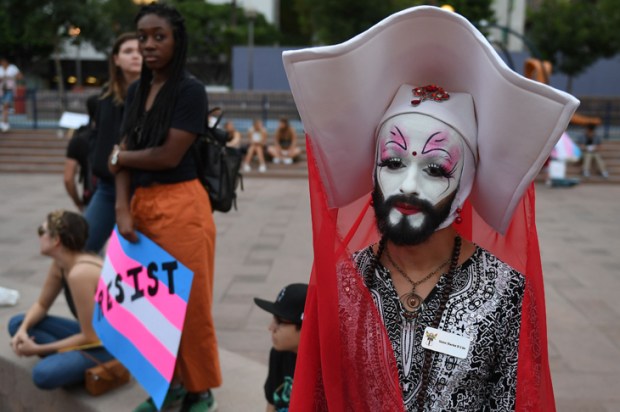‘And the union people crawled away…’- Billy Joel, Allentown
‘Funny that Billy just endorsed Hillary. He must have forgotten about Allentown’ – Anonymous YouTube commenter
As someone who has spent twenty years telling anyone who would listen that identity politics is concentrated evil, it nonetheless gives me no pleasure to say – now Donald Trump is President-elect – ‘I told you so’.
Anyone who hasn’t been living under a rock for the last thirty years knows that progressives have long played identity politics, using it to build winning – but fragile – electoral coalitions. Trump figured out how to do the same thing for conservative populism, and because his was grounded in genuine economic disadvantage, he garnered enough support among those the ‘identitarian left’ thought they had in the bag – blacks and Hispanics – to cobble together a winning electoral coalition of his own.
For fairly obvious reasons, I don’t consider this a positive development, but I do consider it an inevitable one. Reducing people to their skin colour, genitalia, orientation, or religion (while turning a blind eye to class) made it increasingly likely someone on the right would try it on the longer lefties persisted with it.
First, some cliometrics.
Among Americans earning below USD$30,000 a year, there was a 16-point swing away from the Democrats. University-educated whites were 10 percentage points more Democratic in 2016 than they were in 2012, while non-university whites were 14 percentage points more Republican. The upshot was an extraordinary ‘diploma divide’ in white support for Trump. 95 per cent of the post-GFC jobs created in the US have gone to university-educated workers. Yes, that means people with tertiary qualifications have snaffled 11 million of the 11.6 million new jobs created. That, without more, explains the ‘diploma divide’.
Further, more black and Hispanic people voted for Donald Trump than voted for the GOP in 2012. Meanwhile, many of those who voted Trump this time around voted for Obama four years ago: Scranton, PA; Macomb County, Detroit; Wisconsin. If those once-were-Obama voters are racist, then ‘racism’ as a term has ceased to have meaning. And if those non-university educated voters have ‘privilege’, then ‘privilege’ as a term has also ceased to have meaning.
Let me explain.
The Oppression Olympics is a common social media game. It involves identitarian lefties telling white people and righties of all colours to ‘check their privilege’. It encourages people to think of themselves as victims, as yet another special interest group. In the past, the usual righty riposte was to suggest privilege claims represent an attempt to apply statistical averages to individuals. Arguments from privilege are like stating – upon meeting a gay man, say – that just because many gay men like ABBA, the gay man one has just met must also like ABBA.
However, the alt-right – Trump’s Internet shock troops – instead opted to play the Oppression Olympics. And often, they won. Jewish progressives were asked what their annual salaries were. Black progressives were asked if they needed affirmative action or sporting scholarships to gain admission to university. Feminists were asked if they were able to keep their high-powered jobs by dint of state-mandated or corporate maternity leave policies. The meltdowns I saw in response to what are relatively simple challenges were staggering, not because they give the lie to who is most oppressed in ‘these United States’, but because they revealed the hollowness of identity politics.
As soon as other people can show they’re more oppressed than you, they get to play their victim card while you have to return yours to the House. And the House always wins. The House, of course, is the State (not one of Donald Trump’s casinos), which grows ever larger at the people’s expense. People have been hyperventilating about ‘whitelash’ since the polls were declared, without appreciating class can found an identity politics claim as surely as race, sex, orientation, or religion. I have no doubt, among the erstwhile autoworkers of Macomb County, Detroit, there are many blacks and Hispanics. For those voters, class trumped race and sex.
I don’t expect readers to dust off the Karl Marx that’s likely on their bookshelves purely for decorative purposes. No one needs to learn anew how daft is the labour theory of value. However, I do expect people to recall the extent to which modern liberalism has its origins in the representation of class interests. People in the United States have often looked askance at the class-based names of UK political parties – Liberals, Tories, Labour. 2016 should teach Americans that class matters there, too.
There is also empirical evidence that countries divided politically along tribal or religious lines fail at democracy, while societies that develop a politics of class produce functioning liberal states with human rights protections. Class has a stronger claim on political bargaining than the other attributes commonly invoked, if only because it is a reliable proxy for poverty and moderately flexible. People can (and do) change class over a lifetime.
Of course, for those of us without any political kinship to the historical labour movement, this isn’t ideal either – identity politics is as identity politics does – but it’s at least explicable.
A flailing American elite attempted to elevate a corporate-diversity-training program into one of the main justifications for its continued rule. Bill Clinton’s cabinet was once memorably described as ‘Harvard educated lawyers of every gender, race, and ethnicity’. As long as the elite was physically diverse, emptying out Allentown was a price worth paying.
Finally, a warning. The conservatives and libertarians who have followed the alt-right – drawn like moths to the bright lights of Donald Trump’s identitarian casino – must understand they are adopting a strategy utterly foreign to their traditions. This is a casino that, in leftie hands, has been the source of much electoral profit over the past two decades, but has also produced a vast and meddling State. People on our side of the aisle should be careful before they put their hard won election victories – and political capital – on the tables. The House always wins.
The post Playing the identity card appeared first on The Spectator.
Got something to add? Join the discussion and comment below.
Get 10 issues for just $10
Subscribe to The Spectator Australia today for the next 10 magazine issues, plus full online access, for just $10.














Comments
Don't miss out
Join the conversation with other Spectator Australia readers. Subscribe to leave a comment.
SUBSCRIBEAlready a subscriber? Log in